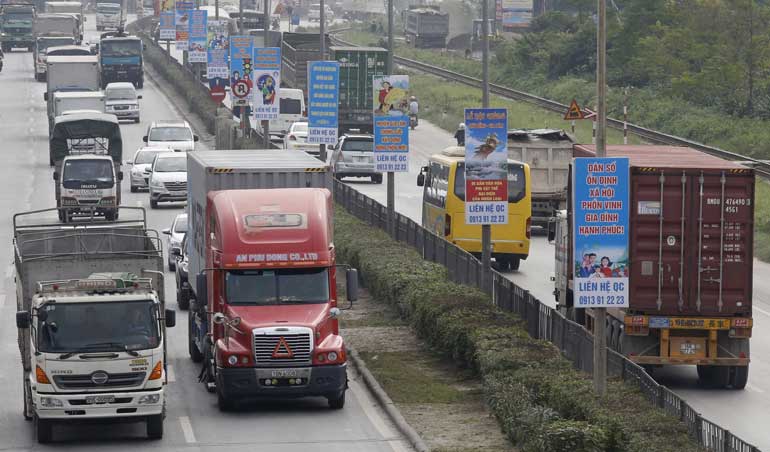Wednesday Feb 18, 2026
Wednesday Feb 18, 2026
Monday, 21 December 2015 00:00 - - {{hitsCtrl.values.hits}}
 Trucks and containers travel on Highway 5 in Hanoi which links to Hai Phong port, Vietnam, 17 December. Vietnam can expect rapid growth in its already fast-expanding logistics industry, buoyed by an anticipated imports-exports boom from new multilateral trade pacts and a surge in domestic retail and e-commerce spending – REUTERS/Kham
Trucks and containers travel on Highway 5 in Hanoi which links to Hai Phong port, Vietnam, 17 December. Vietnam can expect rapid growth in its already fast-expanding logistics industry, buoyed by an anticipated imports-exports boom from new multilateral trade pacts and a surge in domestic retail and e-commerce spending – REUTERS/Kham
Reuters: Vietnam can expect rapid growth in its already fast-expanding logistics industry, buoyed by an anticipated imports-exports boom from new multilateral trade pacts and a surge in domestic retail and e-commerce spending.
Its logistics sector may grow 20-24% this year, with 70% of 1,300 firms expected to rake in profits, according to industry data. That expected growth comes on the heels of a free-trade agreement with the European Union and the US-led Trans-Pacific Partnership (TPP), which is fuelling record foreign investment into factories.
Two weeks after the October conclusion of the TPP, a 12-nation bloc covering 40% of the global economy, logistics equities soared in Vietnam. Shares of shipping firms Gemadept Corp gained 28%, and Viconship was up 20%. Surging trade will be a boon for shipping, rail freight and haulage firms, which are already benefiting from Vietnam’s booming e-commerce. Container volumes in and out of the country have increased about 36% since 2011, including some 1,700 containers a day to the United States.
DHL Express, the first international logistics company to set up shop in Vietnam, says the country is one of its fastest growing markets in the Asia-Pacific. That is helped by e-commerce and increased output of electronics, mainly smartphones and televisions, for brands like Samsung , LG, Intel, Panasonic, Toshiba and Sony < 6758.T>, which represent major opportunities for the logistics market in Vietnam, said a spokesperson for package delivery giant UPS.
Domestic outfits will have a lot to do to step up, however, with supply chains notably weak and logistics costs equivalent to a fifth of GDP, higher than the global average. They also face competition from foreign players, which dominate the sector. “Local firms have to invest more in facilities and human capital to raise their capacity,” said Do Xuan Quang, vice president of the Association of Vietnam Logistics. “Otherwise they cannot compete with foreign players.”